
Owner & Attorney - Atlanta Personal Injury Law Firm
This article has been written and reviewed for legal accuracy and clarity by the team of writers and legal experts at Atlanta Personal Injury Law Firm and is as accurate as possible. This content should not be taken as legal advice from an attorney. If you would like to learn more about our owner and experienced Georgia personal injury lawyer, Nathan Whittenburg, you can do so here.
Atlanta Personal Injury Law Firm does everything possible to make sure the information in this article is up to date and accurate. If you need specific legal advice about your case, contact us. This article should not be taken as advice from an attorney.
On this page, we’ll discuss the common medical treatment for car accident injuries, what types of medical treatments may be covered by your insurance company after a car accident, how a personal injury lawyer can help seek compensation for medical expenses after a car accident, and much more.
When people are injured in a car accident and suffer injuries, understanding the medical coverage available to them is incredibly important.
With injuries that require immediate and potentially long-term care, obtaining the right treatment quickly is a priority.
Car accident victims often struggle to understand how insurers to pay for emergency room visits, surgeries, and ongoing rehabilitation.
Determining who is responsible for covering these costs—whether it’s your insurance company or the at-fault party’s insurer—requires a clear understanding of the available policies and coverage limits.
A car accident lawyer can guide you through the insurance process, negotiating with adjusters to secure the maximum compensation possible for your medical expenses and other related damages.
An experienced lawyer will also work to make sure that all relevant policies are fully leveraged, identifying and advocating for benefits like MedPay, uninsured motorist coverage, and the at-fault party’s insurance to cover your treatment costs.
If you’ve suffered injuries in a car accident at no fault of your own, you may benefit from hiring a lawyer to seek compensation.
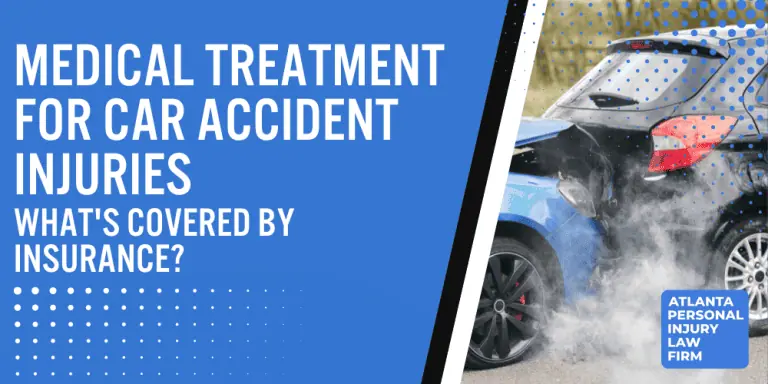
Our personal injury lawyer, Nathan Whittenburg, has made it his mission to secure proper and adequate compensation for car accident victims in the State of Georgia.
Reach out to the Atlanta Personal Injury Law Firm today for a free consultation.
You can also use the chatbot on this page to get in touch with our firm and for a free case review.
The physical and emotional challenges of auto accident injuries can disrupt a person’s life and place a significant financial strain on their family due to high medical expenses.
Understanding the insurance claims process and securing adequate compensation can be challenging, but an experienced personal injury lawyer can ease these burdens.
Reach out to our firm for guidance and support with car accident claims, to find out how lawyers can assist with insurance company negotiations, and more.
We’re here to help you.
When a person is injured in a car accident at no fault of their own, they are typically concerned with how to pay for their medical treatment.
For immediate expenses like emergency room visits, their own insurance coverage through Personal Injury Protection (PIP) or MedPay may offer immediate financial relief, covering initial treatment and assessment regardless of fault.
If the other driver is found liable, their bodily injury liability coverage is supposed to cover the injured party’s ongoing care, such as follow-up visits and physical therapy.
If the at-fault party’s insurance is sufficient to cover the immediate and ongoing medical expenses resulting from the accident, their bodily injury liability coverage should handle the costs.
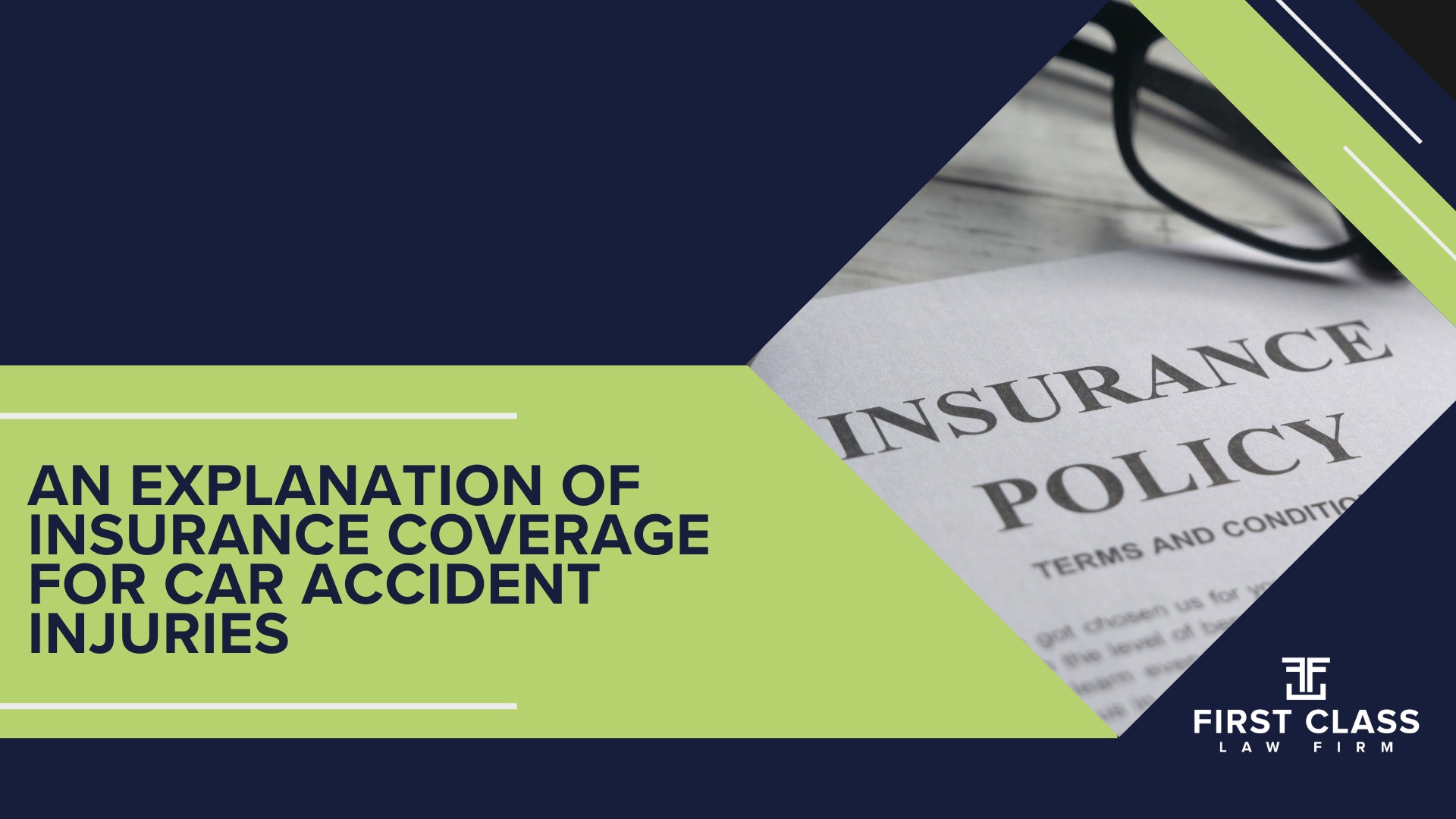
In this scenario, the injured party would typically file a third-party claim against the at-fault driver’s insurance policy.
This claim would include documented medical expenses like emergency room visits, surgeries, physical therapy, and other treatments related to the accident.
An attorney can help in this process by compiling evidence of associated costs and negotiating directly with the insurer for a settlement that fully compensates the victim.
If the at-fault party’s insurance can’t fully cover your car accident injuries, you may need to rely on your own insurance policies for additional compensation.
Uninsured/underinsured motorist (UM/UIM) coverage can bridge the gap if the other driver’s policy has low limits or if they’re uninsured altogether.
Health insurance may also help pay for necessary treatments, though you might need to reimburse them from any settlement due to subrogation.
Seeking guidance from a car accident lawyer is crucial in these types of cases to identify all potential sources of compensation, negotiate with insurers, and ensure you receive adequate coverage for your medical expenses.
After a car accident, it’s essential to know what medical treatments are typically covered by insurance.
Emergency room visits and hospitalization may be immediately required to assess and stabilize injuries.
Ongoing medical care, including follow-up appointments, physical therapy, and prescription medications, is often necessary for recovery.
Rehabilitation services, such as occupational therapy and chiropractic care, help victims regain function and improve their quality of life.
In certain cases, specialized treatments like mental health therapy or consultations with medical experts are crucial for comprehensive recovery.
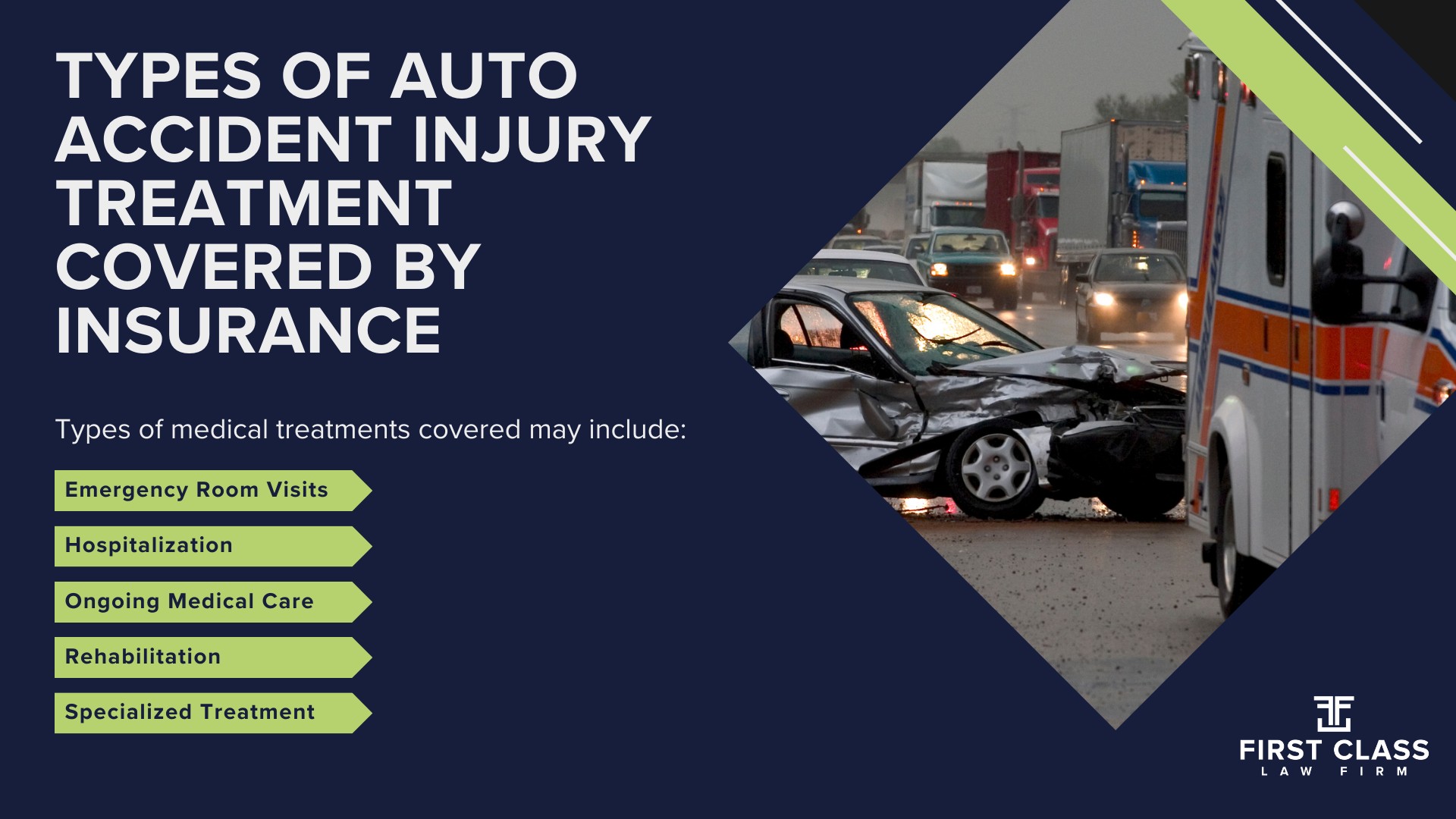
Types of medical treatments covered may include:
Emergency room visits provide crucial medical documentation that forms the foundation of injury claims, clearly detailing the injuries sustained during a car accident.
Seeking immediate treatment strengthens the validity of your claim, as it demonstrates the severity of the injuries and establishes a direct link to the accident itself.
While insurance often covers most ER expenses, deductibles or co-pays may still apply, so it’s essential to keep records of these costs for reimbursement.
Follow-up care with specialists or primary care doctors is also vital, as emergency treatment is often just the initial step in a comprehensive recovery plan.
Reporting the ER visit promptly to your auto or health insurance ensures that expenses are covered accurately and on time.
Hospitalization following a car accident may entail lengthy stays that can lead to substantial bills, sometimes exceeding policy limits.
It is crucial to understand the extent of coverage of your auto and health insurance policies.
Pre-authorization may be required for non-emergency surgeries or extended treatments, so understanding these requirements can prevent claim denials.
It’s important to review itemized bills for errors or overcharges, and a lawyer can assist in identifying and correcting discrepancies.
Hospitals may also seek reimbursement through subrogation if another party is liable, so coordinating with insurers and having a lawyer to represent you may help prevent unexpected expenses.
Ongoing medical care for car accident injuries is a crucial aspect of long-term recovery, encompassing a range of treatments that go beyond the aforementioned emergency and hospital care.
Ongoing medical care often includes follow-up visits with primary care physicians and specialists to monitor the healing process and adjust treatment plans as necessary.
Prescription medications for pain management, inflammation, or infection are also common components of ongoing care.
Diagnostic tests like MRIs, X-rays, and blood tests might be needed periodically to evaluate progress or identify new issues.
Insurance policies often cover these types of treatments if they’re directly linked to the car accident and are deemed medically necessary.
Some insurance policies impose limits on coverage for certain services or set total caps, so being aware of these constraints will help avoid unexpected out-of-pocket expenses.
Coordination between health and auto insurance is crucial to prevent denied claims and ensure continued access to necessary treatments.
The help of a lawyer can be beneficial in justifying the need for prolonged care, as an attorney can provide comprehensive documentation and negotiate with insurers in an attempt to maximize coverage.
Rehabilitative care for car accident injuries focuses on restoring functionality, mobility, range of motion, and overall quality of life after serious injuries.
Your medical professional will establish a personalized treatment plan according to the your unique needs.
Strategies may include physical therapy to improve movement and strength, occupational therapy to regain skills necessary for daily activities, and speech therapy for communication difficulties resulting from head injuries.
Rehabilitation may also involve pain management strategies, adaptive equipment training, and psychological support to address the mental health impacts of long-term recovery.
This type of care is often covered by insurance when deemed medically necessary, but it may require documentation from primary physicians and specialists.
Care is typically provided by a multidisciplinary team, including therapists, physicians, and mental health professionals, who work together to develop a holistic treatment plan.
For those returning to work, the rehabilitation process may involve occupational guidance to ensure a safe transition back or assistance in finding alternative roles if previous duties can’t be resumed.
Specialized treatment for car accident injuries refers to highly specific medical interventions needed for complex or less common injuries.
This can include consultations with neurologists or orthopedic surgeons for advanced diagnostics, as well as procedures like spinal surgery or nerve repair.
Mental health therapy, such as counseling for post-traumatic stress disorder (PTSD) or anxiety, may also be considered specialized care.
Insurance often covers these treatments when prescribed by a primary care physician or specialist, but approval may require detailed documentation to demonstrate medical necessity.
Some insurers may request second opinions or prior authorization before covering expensive surgeries or long-term mental health support.
Having a lawyer to negotiate with healthcare providers to justify the need for specialized treatment may be required for the injured party to receive appropriate coverage without facing undue financial burdens.
Insurance coverage for car accident injuries is designed to ensure that victims receive compensation for their medical treatment and related expenses after an accident.
The process generally involves filing claims to determine liability, calculate damages, and secure appropriate benefits.
This system can be complex for people who have been injured, especially due to varying policy limits, coverage types, and the need for proper documentation of injuries and treatments.
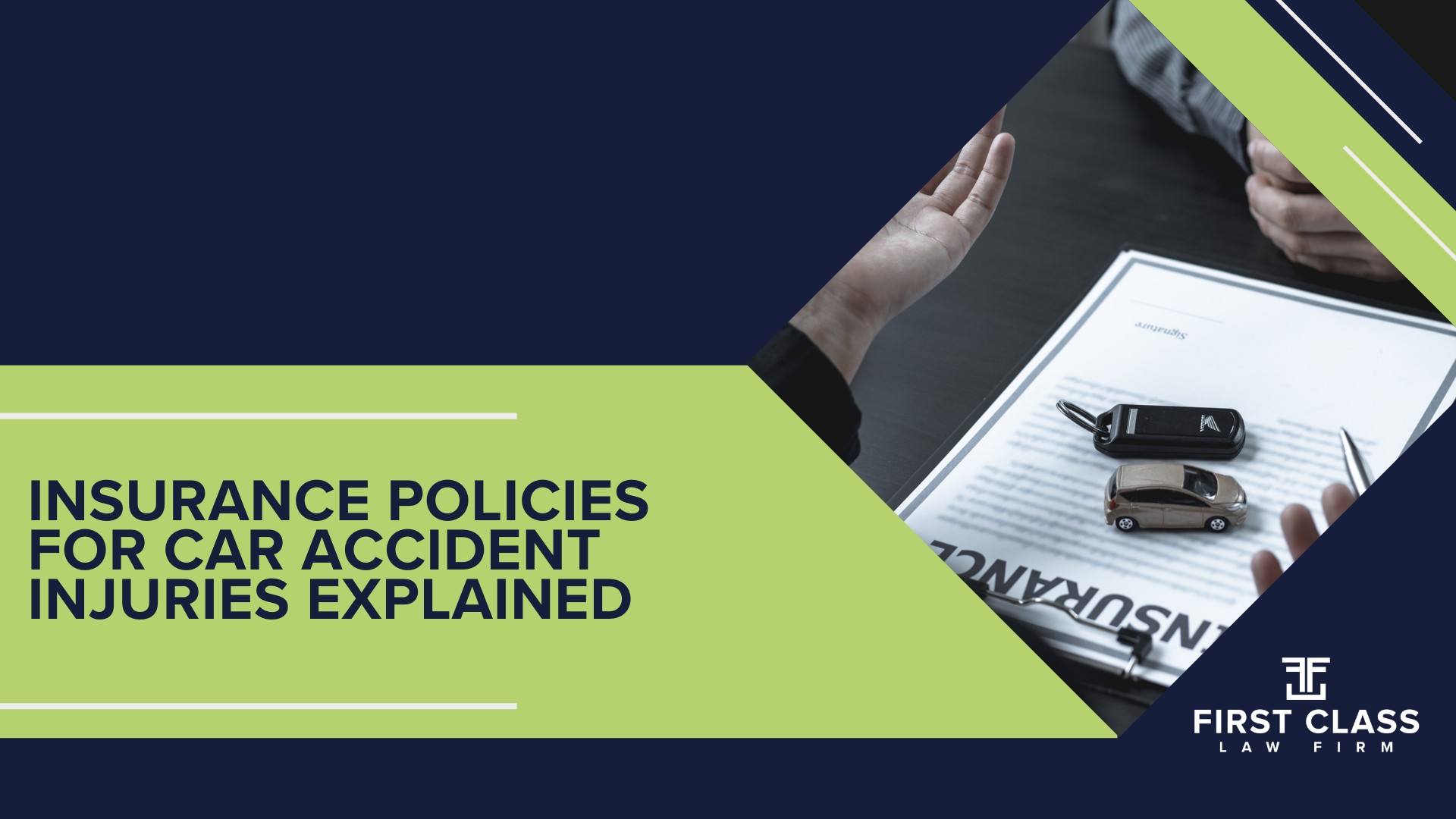
Negotiating settlements or pursuing legal action might be required to obtain fair compensation.
Different insurance plans cover varying aspects of car accident injuries, with each policy offering specific benefits for medical treatment, vehicle repairs, or compensation based on its unique terms and coverage limits.
Personal Injury Protection (PIP) insurance is a type of auto insurance coverage that provides immediate financial assistance for medical expenses and lost wages, regardless of fault.
Often referred to as “no-fault” insurance, PIP aims to ensure that accident victims receive prompt care and compensation without having to wait for liability to be determined.
This coverage typically includes emergency room visits, rehabilitation, and even funeral expenses if necessary.
PIP is mandatory in some states and optional in others, with policy limits varying based on jurisdiction and individual preferences.
Health insurance plays an essential role in car accident injury claims, particularly when auto insurance benefits have been exhausted.
Health insurance helps cover medical costs related to emergency room visits, surgeries, physical therapy, and prescriptions, ensuring comprehensive care for victims.
However, health insurers often pursue reimbursement (subrogation) from any eventual auto insurance settlement, which can impact the total payout received.
Understanding the interaction between health and auto insurance policies is crucial for maximizing benefits and minimizing out-of-pocket expenses during recovery.
Liability insurance is a type of auto insurance coverage that protects drivers who are found at fault in a car accident by paying for the injuries and property damage caused to others.
It usually comprises two components: bodily injury liability for medical expenses and lost wages, and property damage liability for vehicle repairs or replacements.
Most states require drivers to carry minimum liability insurance to ensure that accident victims have access to compensation.
While this insurance safeguards the at-fault driver from bearing full financial responsibility, it may still require them to pay out-of-pocket if damages exceed policy limits.
Medicare and Medicaid can help cover auto injury treatment, particularly for those who meet specific eligibility criteria.
While Medicare typically serves seniors and individuals with certain disabilities, Medicaid extends its benefits to those with lower incomes, providing access to emergency treatment, rehabilitation, and long-term care.
These programs often require coordination with auto insurers and other coverage sources to ensure primary and secondary payers are properly identified.
It’s crucial for beneficiaries to understand potential subrogation, where Medicare/Medicaid seeks reimbursement from any settlements to cover the costs of treatments initially paid by these government programs.
Uninsured/underinsured motorist (UM/UIM) coverage protects drivers when the at-fault party in a car accident either has no insurance or insufficient coverage to pay for the resulting injuries and damages.
This type of insurance helps bridge the gap by providing compensation for medical expenses, lost wages, and pain and suffering that otherwise would not be covered.
UM/UIM coverage is optional in some states and mandatory in others.
UM/UIM coverage helps make sure that accident victims have a financial safety net when the responsible party cannot fully compensate them.
This type of coverage operates similarly to other auto insurance claims, requiring detailed documentation of losses and proof of liability.
Securing this coverage is essential for protecting yourself and your passengers from financial hardship due to others’ negligence, particularly those without adequate insurance coverage.
Car accidents can cause a number of different injuries that can impact a person’s quality of life, ability to work, and overall well-being.
Some injuries may heal quickly, while others can result in long-term or permanent disabilities, necessitating ongoing medical care and financial support.
Understanding the types of injuries that commonly occur in car accidents is crucial for identifying necessary treatments and accurately calculating compensation.
Proper documentation of these injuries will support your claim and help ensure that all relevant damages are covered.
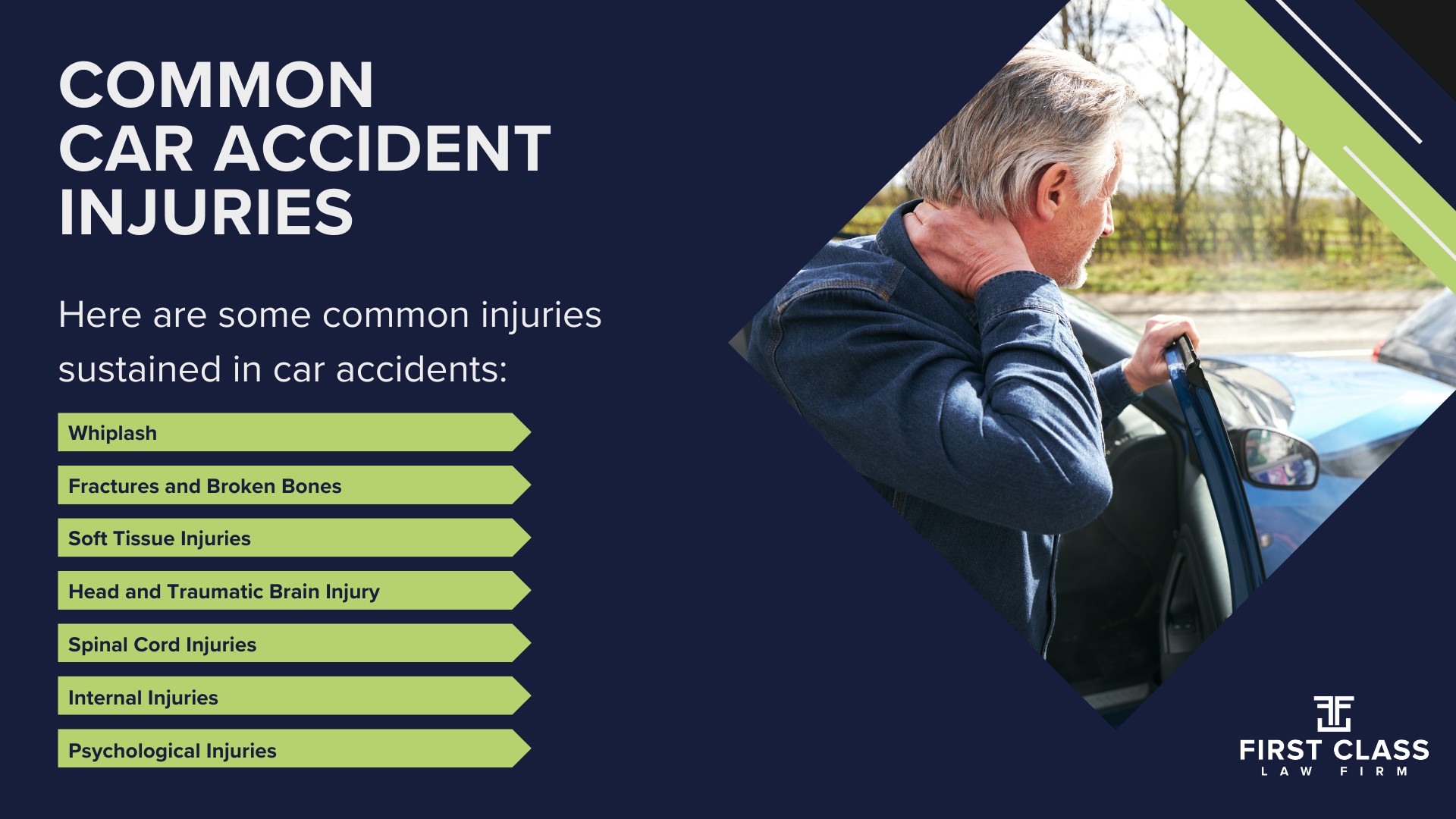
Here are some common injuries sustained in car accidents:
Motor vehicle accidents can be extremely traumatizing, but knowing what to do immediately afterward can protect your legal rights.
The first steps you take can impact the outcome of your insurance claims and any potential lawsuits.
Acting quickly and correctly ensures you have the best chance of securing fair compensation and receiving the care you need.
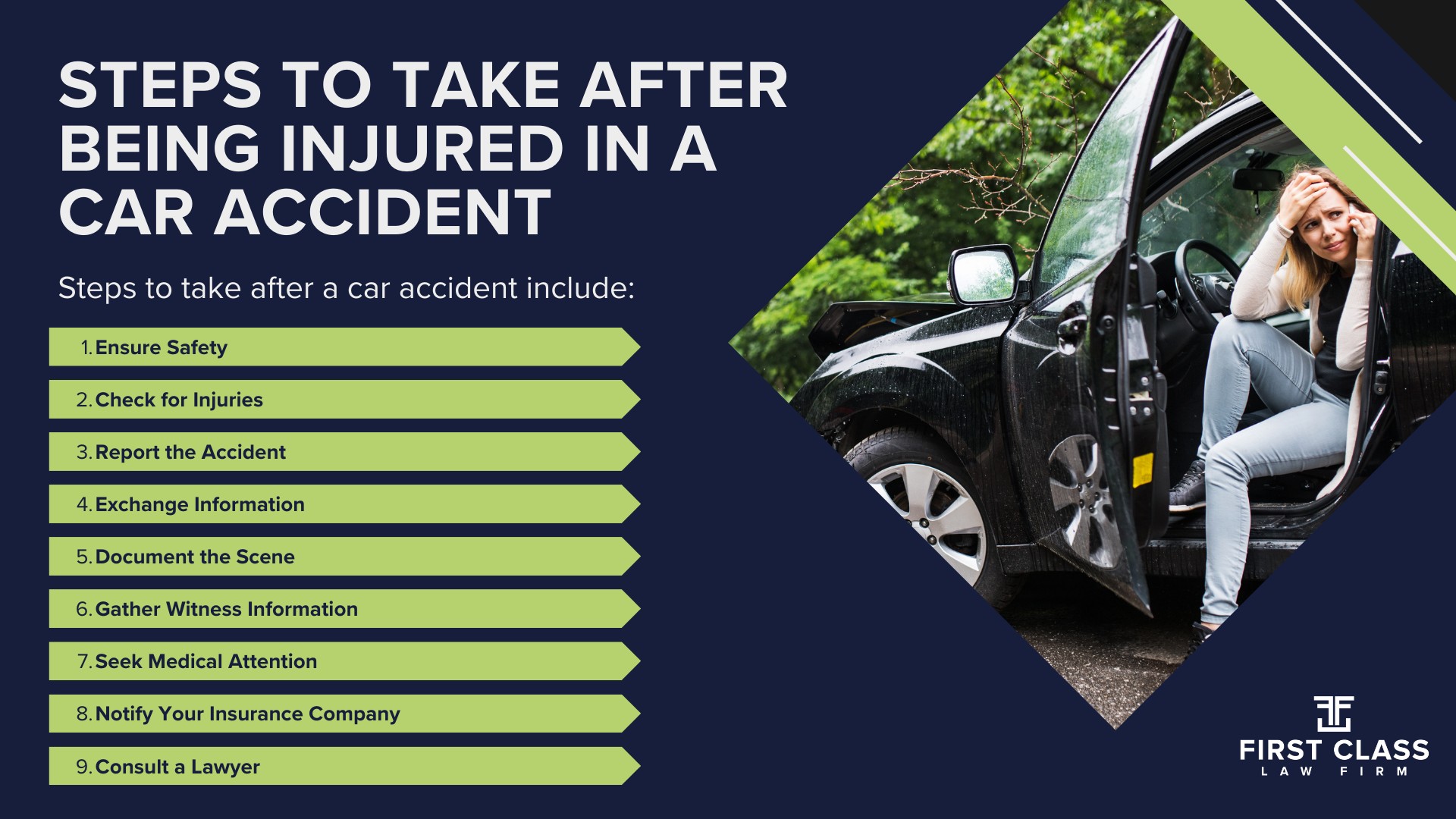
Steps to take after a car accident include:
Car accident victims often feel overwhelmed by the insurance process after being injured.
Understanding claims and policy limits can be confusing and complicated while focusing on recovery.
An experienced personal injury lawyer helps ease this burden by handling communications with insurance companies, negotiating fair compensation, and ensuring that all medical documentation is accurate and comprehensive.
The role of a car accident lawyer is to alleviate the stress of insurance claim negotiations and allow victims to focus on healing.
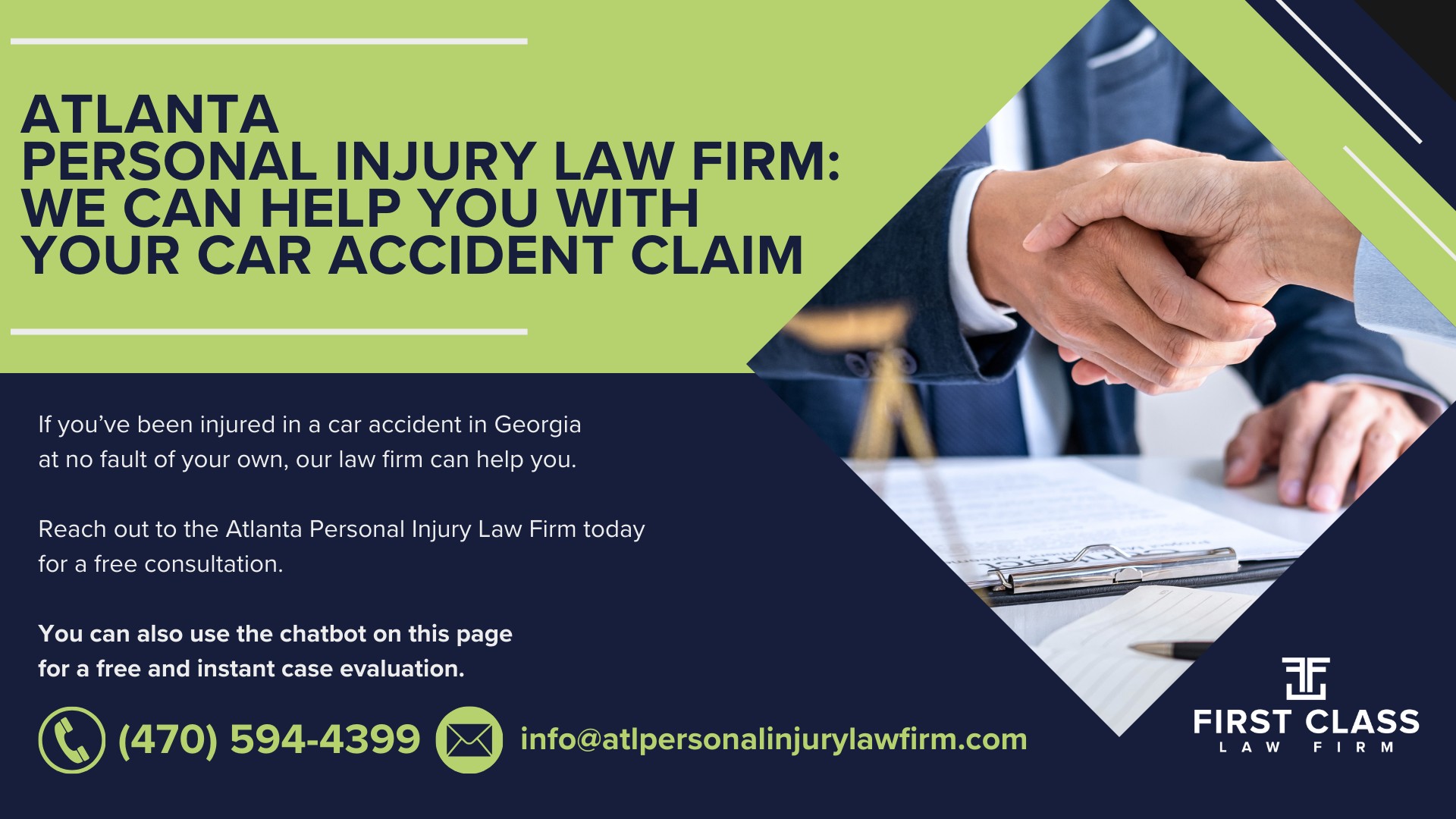
If you’ve been injured in a car accident in Georgia at no fault of your own, our law firm can help you.
Reach out to the Atlanta Personal Injury Law Firm today for a free consultation.
You can also use the chatbot on this page for a free and instant case evaluation.
Insurance typically covers medical treatments deemed necessary and reasonable, such as emergency room visits, hospitalization, surgeries, and ongoing medical care including physical therapy.
Coverage specifics can vary based on the policy details and the state laws governing auto insurance.
It’s important to review your insurance policy or consult with your insurer to understand the extent of your coverage, including any deductibles or co-pays that may apply.
An experienced personal injury lawyer can help in negotiations with insurance providers.
To file a claim for medical treatment after a car accident, first notify your insurance company about the accident as soon as possible.
Provide them with a detailed account of the accident and the resulting injuries.
You’ll need to submit relevant medical records, bills, and proof of any other related expenses.
Your insurance company may also require a completed claim form or personal statement detailing the accident and your injuries.
A personal injury lawyer will help by documenting all medical treatments and their costs, calculating and assessing damages incurred, and negotiating with insurance companies.
Lawyers work to accurately present all medical evidence and argue for a fair settlement that covers both current and future medical expenses related to the car accident.
If a settlement offer is inefficient, a lawyer can represent a car accident victim in court to fight for rightful compensation.
Our firm specializes in personal injury cases across the state of Georgia, working on a contingency fee basis to ensure the best possible service for each client.
Click below to get a free, instant case evaluation and find out if you qualify for legal action immediately.
Would you like our help?
Atlanta Personal Injury Law Firm specializes in personal injury cases across Georgia, including motor vehicle accidents, premises liability, catastrophic injuries, and wrongful death claims. Our experienced Georgia injury attorney works on a contingency fee basis, ensuring you only pay legal fees once we secure your settlement or verdict.
Contact our experienced legal team by phone or visit our website for a instant case evaluation. Trust Atlanta Personal Injury Law Firm for dedicated legal representation in Georgia.
Our firm specializes in personal injury cases across the state of Georgia, working on a contingency fee basis to ensure the best possible service for each client.
Click below to get a free, instant case evaluation and find out if you qualify for legal action immediately.
Would you like our help?
Disclaimer: “Don’t Pay Unless You Win” and similar language refers only to fees charged by the attorney. Court costs and other additional expenses of legal action usually must be paid by the client. Contingent fees are not permitted in all types of cases. This website is an advertisement. Nothing is meant to be taken as legal advice or to give the impression that an attorney-client relationship has been created. Please speak with a legal professional.